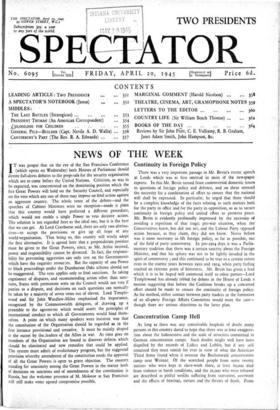I T was proper that on the eve of the San
Francisco Conference (which opens on Wednesday) both Houses of Parliament should devote full-dress debates to the proposals for the security organisation
NEWS OF THE WEEK
which are to come before the United Nations. Criticism, as was to be expected, was concentrated on the dominating position which the five Great Powers will hold on the Security Council, and especially on the veto which any one of them may impose on final action against an aggressor country. The whole tenor of the debate—and the speeches of Cabinet Ministers were no exception—made it plain that this country would have preferred a different procedure, which would not enable a single Power to veto decisive action. The solution is not regarded here as the ideal one, but it is the best that we can get. M Lord Cranborne said, there are only two alterna- tives—to accept the provisions or give up all hope of any world -organisation. That being so, this country will wisely adopt the first alternative. It is agreed here that a preponderant position must be given to the Great Powers, since, as Mr. Attlee insisted, power and re§ponsibility cannot be divorced. In fact, the responsi- bility for preventing aggression can only rest on the Governments which have the requisite resources. But the capacity of one Power to block proceedings under the Dumbarton Oaks scheme should not be exaggerated. The veto applies only to final sanctions. In taking cognisance of disputes, and recommending action other than sanc- tions, States with permanent seats on the Council would not vote if parries to a dispute, and decisions on such questions can normally be taken by a majority of seven votes out of eleven. Lord Temple- wood and Sir John Wardlaw-Milne emphasised the importance, recognised by the Commonwealth delegates, of drawing up a preamble to the agreement which would assert the principles of international conduct to which all Governments would bind them- selves. A point on which many speakers were insistent was that the constitution of the Organisation should be regarded as in the first instance provisional and tentative. It must be mainly shaped at the outset by the-leaders of the Allies in war. As time goes on members of the Organisation are bound to discover defects. which should be eliminated and new remedies that could be applied. The system must admit of evolutionary progress, but the suggested provision whereby amendment of the constitution needs the approval of all the Great Powers is open to grave objection. The country standing for unanimity among the Great Powers in the matter both of decisions on sanctions and of amendments of the constitution is Russia, but the welcome presence of M. Molotov at San Francisco will still make some agreed compromise possible.


























